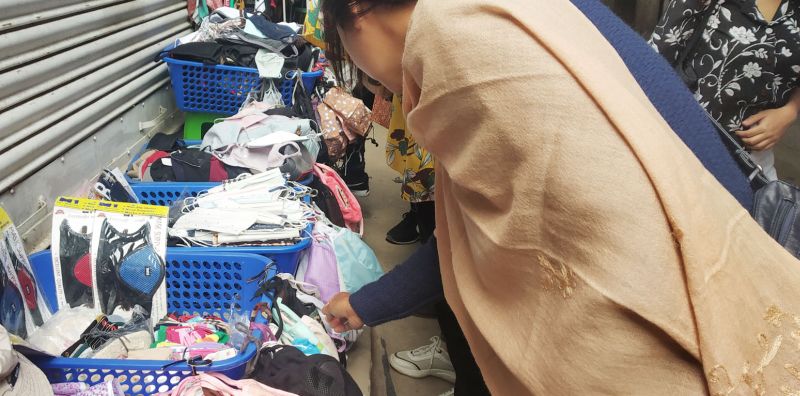Dirty money? Banks say currency notes are being disinfected

Customers seen purchasing masks from a street vendor in Kohima on March 17. (Morung Photo)
Atono Tsükrü Kense
Kohima | March 17
Washing hands regularly is being pegged as the best bet in the fight against coronavirus. But how can one get rid of the possibility of contracting the virus through articles that come in our contact daily - such as currency notes?
A study published by the International Journal of Current Engineering and Scientific Research in 2018 found that currency notes of denominations of 100, 50, 20 and 10 collected from various sources were contaminated with Escherichia coli, Salmonella typhi and others. The study showed prevalence of multiple drug resistant bacteria in the currency notes.
Another study by the Indian Journal of Medicine and Public Health in 2015 found that 96 notes and 48 coins were found to harbor bacteria, fungus and parasites, while a study by the International Journal of Advanced Research (IJAR) in 2016 found that 58% of the Indian currency notes were contaminated both with pathogenic and non pathogenic organisms that may lead to a number of infectious diseases including urinary and respiratory tract infections, skin infections, recurrent meningitis etc.
In Nagaland where majority of the population still prefer hard cash transactions, fears and concerns that currency notes are potential health hazards to those working in the financial institutions as well as customers are being raised among the populace. The Morung Express visited some banks to find out how the institutions are taking preventive measures for the safety of its employees and customers.
Hepuni Bismarck who is the Assistant General Manager at the State Bank of India, Kohima Branch, said disinfectants are normally used while cash transactions are made as multiple hands are involve, however, with the onset on the pandemic COVID-19, SBI has instructed its employees to compulsorily and regularly use mask and hand sanitisers.
He also informed that SBI is using fresh notes for cash payment. However, with the bank being compelled to accept old notes from its customers, he said that the notes are disinfected in the segregation machine.
Bismarck advised customers not to visit the bank if they have any symptoms of the virus for the safety of all and further narrated that he had advised a customer to go home and rest when he started sneezing inside the bank premises.
While the educational institutions are closed down as a precautionary measure, he maintained that banks cannot afford to remain closed as it would affect the public in numerous ways.
‘We cannot prevent people from coming into the banks” said Bismarck and therefore, employees have been advised to constantly wash their hands after handling cash and to drink lots of hot water.
Branch Manager at Vijaya Bank, Kohima, Suresh K said his employees have been instructed to use masks, gloves and sanitisers as precautionary measures. Its priority, he said is the safety of both its employees and customers.
Some bank officials have informed that it has been receiving awareness mail from its central headquarters with instructions on the ‘dos and don’ts’ and what to do if there are any suspected case among its employees.
Shortages of masks and sanitisers
With panic buying leading to shortage in supply of masks and hand sanitisers in medical stores, street vendors in the state capital are making brisk business selling masks in different shapes and designs.
While WHO and CDC have recommended that wearing of mask is not necessary unless one is showing COVID-19 symptoms or in close contact with someone infected with the virus, people are seen thronging to buy masks in huge quantities. It has also stated that people with no respiratory symptoms do not need to wear medical mask while sole use of the mask is insufficient for an adequate level of protection.
Several medical stores in and around Kohima town have revealed that stock of masks and sanitisers have run out since last month, and procurement of fresh stock from Guwahati is yet to reach the stores. They also claimed that stock has run out even in Guwahati.






